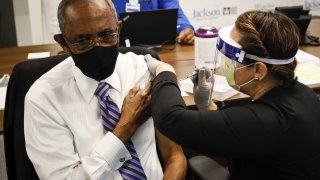
- The Trump administration is issuing new guidelines that expand coronavirus vaccine eligibility to everyone 65 years old and above, a senior administration official said.
- States' focus on vaccinating health-care workers and nursing homes has created a bottleneck, the official said.
The Trump administration on Tuesday issued new guidelines that expand coronavirus vaccine eligibility to everyone age 65 and older as well as to those with comorbid conditions, like diabetes.
The states' focus on vaccinating health-care workers and nursing homes has created a bottleneck, a senior administration official told CNBC, speaking on condition of anonymity in advance of the formal announcement.
Get top local stories in Philly delivered to you every morning. >Sign up for NBC Philadelphia's News Headlines newsletter.
"The states are being told immediately they need to expand to 65-plus as well as those under 65 with comorbid conditions," the official said.
The administration will also stop holding back millions of doses reserved for the second round of shots of Pfizer and Moderna's two-dose vaccines, the official said, adding they released doses that had been held in reserve on Sunday.
"States should not be waiting to complete phase 1a prioritization before proceeding to broader categories of eligibility," Azar said Tuesday, explaining the new guidance. "Think of it like boarding an airplane. You might have a sequential order in which you board people. But you don't wait 'til literally every person from a group is boarded before moving on to the next."
Money Report
Some 53 million Americans who are 65 and older and 110 million people between 16 and 64 with comorbid conditions will now be eligible to receive the vaccine if every state adopts the guidelines, according to the Centers for Disease Control and Prevention.
President-elect Joe Biden's transition team announced Friday that his administration planned to release all doses held in reserve.
The Trump administration was expected to announce the change at a press conference Tuesday with officials from Operation Warp Speed, the White House vaccine program.
U.S. Surgeon General Jerome Adams also confirmed the changes in an interview with Fox News Tuesday morning, saying the Centers for Disease Control and Prevention's previous prioritization guidelines to states was "actually causing governors and states to slow a little bit."
"We are going to have clear guidance from the CDC to governors that they should vaccinate people 65 and above and anyone below 64 who has a chronic medical condition," he said.
U.S. officials are trying to pick up the pace of vaccinations after a slower-than-expected rollout.
As of Monday morning, more than 25.4 million doses had been distributed across the U.S., but just over 8.9 million shots have been administered, according to CDC data. The number is a far cry from the federal government's goal of inoculating 20 million Americans by the end of 2020 and 50 million Americans by the end of this month.
State and local health officials have said they are strapped for cash. They blame insufficient funding and inconsistent communication from the federal government for the slow rollout.
Democrats and some public health experts have criticized the administration for the slow pace. In a letter Monday, Senate Democrats demanded the administration make changes, saying it has "failed" states by not providing detailed guidance on how to effectively distribute the doses.
The U.S. "cannot afford this vaccination campaign to continue to be hindered by the lack of planning, communication, and leadership we have seen so far," Senate Minority Leader Chuck Schumer and 44 other Democrats wrote. "The metric that matters, and where we are clearly moving too slowly, is vaccines in arms."
In an attempt to pick up the pace of vaccinations, Health and Human Services Secretary Alex Azar and Food and Drug Administration Commissioner Dr. Stephen Hahn urged states last week to begin vaccinating lower-priority groups against Covid-19.
The CDC recommends immunizing health-care workers and nursing homes first, but states can distribute the vaccine as they see fit. Hahn told reporters that states should give shots to groups that "make sense," such as the elderly, people with preexisting conditions, police, firefighters and other essential workers.
"We've heard in the press that some folks have said, 'OK, I'm waiting to get all of my health-care workers vaccinated. We have about 35% uptake of the vaccine.' I think it reasonable to expand that" to other groups, Hahn said Friday. "I would strongly encourage that we move forward with giving states the opportunity to be more expansive in who they can give the vaccine to."
It's unclear if expanding the eligibility will pick up the pace of vaccinations. Some states, including Texas and Florida, have already expanded their eligibility criteria.






